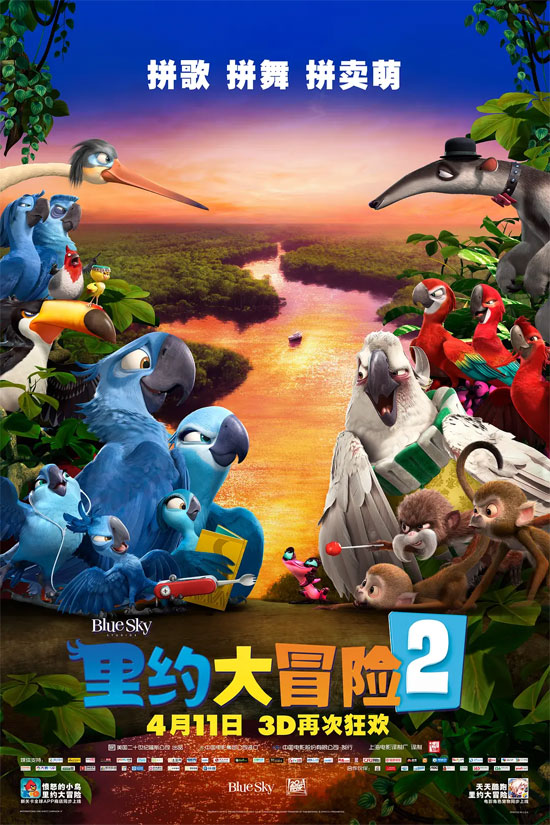Film Name: 里约大冒险2 / Rio 2

It’s said that “Rio” is a trilogy, but by this sequel, its themes feel remarkably complete—leaving little room for growth. Wouldn’t you agree? This film encompasses love (both conventional and unconventional), family bonds, revenge, conflict, soccer, song and dance, human-animal connections, environmentalism, the vibrant energy of Rio de Janeiro, and the lush Amazon rainforest… …I honestly can’t think of anything it lacks.
If the first film showed Blu rediscovering his wild side—daring to fly—and emphasized the importance of nature, then the second film made his human-like qualities the key to saving his species, highlighting the importance of coexisting harmoniously with humans. The relationship between animals and humans—whether as pets and owners or as friends—reveals its double-edged sword nature, explored in both films. From this perspective, I struggle to imagine what new ground a third installment could break in depicting the bond between humans and macaws.
Nigel, who loves reciting Shakespeare, staged his own tragic tale of vengeance; the tree frog uses her vibrant pink coloration to mimic toxicity, even convincing others she’s genuinely poisonous—yet she never disguises her feelings for love; Robert, the pride of the macaw tribe, possesses countless captivating qualities—handsome looks, a beautiful singing voice, and exceptional soccer skills—yet he shrinks in the presence of humans. Individuals lost in self-absorption, those who blind themselves while revealing their true selves, and those who mask their insecurities with flamboyance—aren’t such characters vividly present everywhere in life?
While many reviews discuss Nigel and Tree Frog, few address Robert. In truth, Robert serves as the film’s foil to Bruce. He surpasses Bruce in every outward aspect, yet lacks the courage to protect his family in true crisis. Through Bruce’s ultimate triumph, the director reveals what kind of person truly stands as the most dependable in life.
The film breaks the balance established in the first installment through its portrayal of the blue macaw’s rarity. When we view Blu through the lens of scarcity—just as he once perceived himself—the film takes on a tragic veneer. No matter how vibrant its content or how celebratory its tone, it ultimately remains the story of Blu’s solitary existence, or at best, the lonely survival of his immediate family. But the sequel abruptly strips away this hidden tragic shell. It turns out Blu isn’t alone—he has a flock, a home. At this point, the film shifts into pure comedy mode.
This transformation represents a crucial emotional shift in “Rio 2.” It would have been even better if the film had more fully expressed Blu’s mixed feelings of surprise and loss as he went from believing he was the only one to suddenly discovering he was not. If I were Blu, upon learning other blue macaws existed in the world, would I simply look forward to finding them? After all, it’s worth pondering whether their existence diminishes or enhances my own value. Perhaps initially I’d feel diminished, but gradually I’d come to recognize my value within the flock.
Another noteworthy change in this sequel is that Blu not only falls in love but also becomes a father. The reason fairy tales of princes and princesses rarely have futures is that once children enter the picture, the story shifts from idealistic romance back to realistic, mundane reality. Thus, the film’s portrayal of Bruce’s relationship with his family—especially his children—carries that characteristic American cinematic tendency to skim the surface. This may itself reflect American views on family and parenting, but ultimately, the father’s discipline and influence over his children remain underdeveloped. Audiences are more likely to be moved by the affection between Bruce’s wife and her father, while the protagonist’s own family struggles to convey the intense emotional bonds one might expect. In other words, it possesses romantic love but lacks paternal affection.
The film repeatedly emphasizes at the outset that Bruce is a man who loves to say “no.” Unfortunately, it fails to follow through on this thread, missing an opportunity to highlight his shift from a philosophy of what he cannot do to one of what he can achieve. I kept anticipating the moment he would stop saying “no,” but this pivotal declaration never materialized.
Please specify:Anime Phone Cases » Rio 2 2014 Animation Film Review: All Sorts of People in Life and Beyond